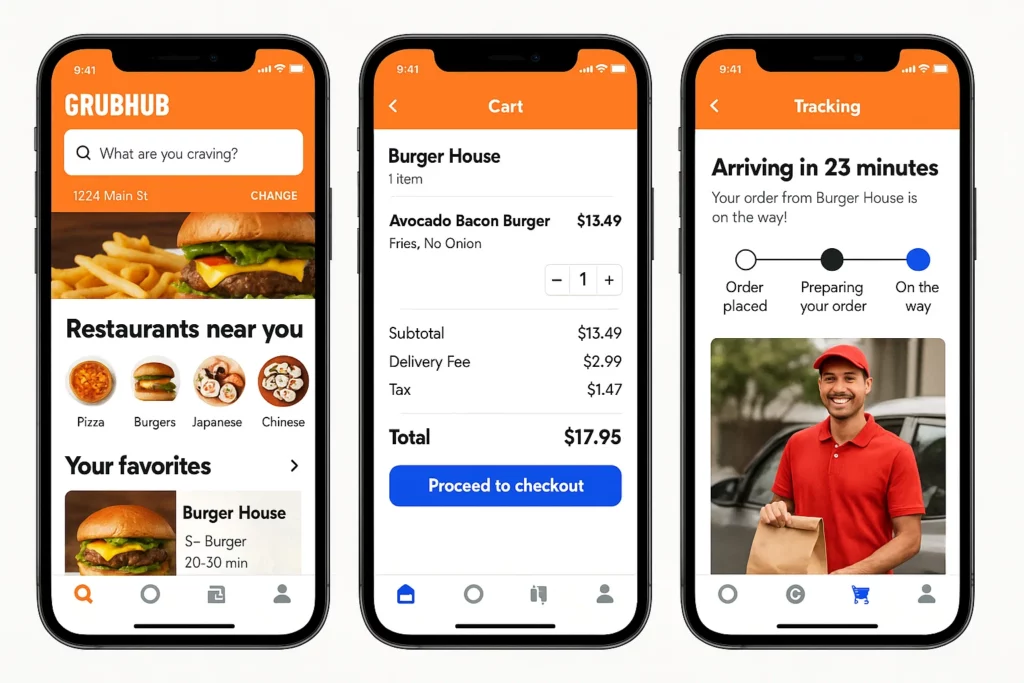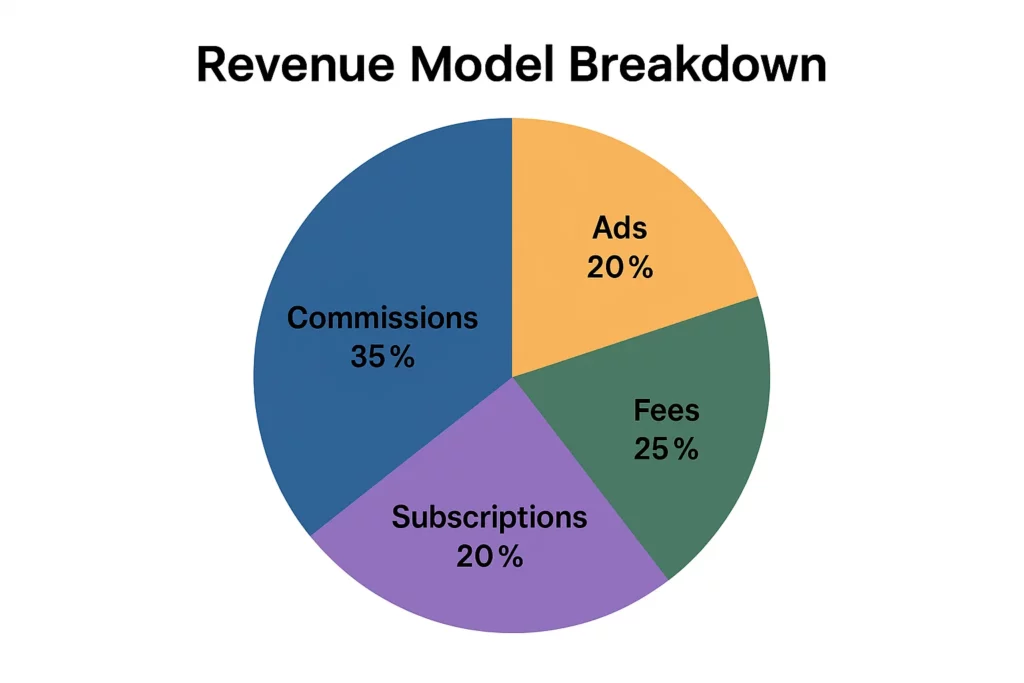Ever been hangry at 10 p.m. with nothing in the fridge but condiments and questionable leftovers? We’ve all been there. That’s the magic moment where apps like Grubhub swoop in like food delivery superheroes — connecting your cravings to your door in minutes.
But Grubhub isn’t just a late-night lifesaver. It’s a tech-savvy marketplace that changed how we eat, work, and even build businesses. Whether you’re an aspiring entrepreneur, a side-hustling chef, or a startup founder with an idea for the next big food delivery app — knowing how Grubhub works is like holding the blueprint to the kitchen kingdom.
At Miracuves, we don’t just study these apps — we help creators like you launch and scale high-performance Grubhub clone apps that are sleek, smart, and cash-flow friendly.
What Exactly is the Grubhub App?
Grubhub is a U.S.-based online food ordering and delivery platform that lets users browse nearby restaurants, order meals, and have them delivered by drivers. It acts as a digital bridge between hungry customers, local restaurants, and gig delivery drivers — a true three-sided marketplace.
Founded in 2004 (yep, before “apps” were cool), Grubhub was one of the early birds in the on-demand delivery game. Today, it partners with over 300,000 restaurants across 4,000+ cities in the U.S. and has been acquired by Just Eat Takeaway.
Get your own feature-rich food delivery platform from a top-rated development company with proven success in the industry.
Key Features:
- Live tracking of deliveries
- Search filters by cuisine, pricing, dietary preferences
- Promotions, loyalty programs, and in-app payment
- Customer reviews and ratings

How Does Grubhub Work? (Step-by-Step)
1. User Journey: From Craving to Checkout
Let’s say it’s Taco Tuesday. You open the app, search for “tacos,” compare a few options, read some salty reviews, and add a bunch of stuff to your cart. Boom — you hit pay, and the countdown begins.
Steps for Customers:
- Open the app / website
- Enter address to view local options
- Browse, filter, and select meals
- Add to cart, apply promos
- Pay via card, wallet, or gift card
- Track order in real-time

2. Restaurant Partner Experience
Restaurants can either:
- Use their own staff for deliveries
- Use Grubhub’s delivery fleet (Grubhub+)
- Integrate with point-of-sale systems
They get visibility, manage orders through a dashboard, and can offer discounts or loyalty deals to increase volume.
Microtrend: Many small eateries now launch “delivery-only” cloud kitchens — powered by apps like Grubhub.
Also Read :-Creating Your Own Grubhub Clone: Key Features and Development Steps
3. Delivery Driver Flow
Drivers (aka delivery partners) are independent contractors. They sign up, set availability, accept orders via the Grubhub for Drivers app, and get paid per delivery — plus tips.
Driver Features:
- Optimized delivery routes
- Real-time earnings tracking
- Flexible shift scheduling
How Does Grubhub Make Money?
Here’s where the business model gets juicy.
1. Commission from Restaurants
Restaurants pay 10%–30% per order depending on whether Grubhub handles delivery.
2. Delivery Fees from Customers
Users pay a delivery charge and sometimes a service fee. Plus, Grubhub offers Grubhub+ (a subscription model) with unlimited free deliveries.
3. Promoted Listings & Ads
Restaurants can pay to appear higher in search results — similar to Instagram boosting posts.
4. White-Label & API Services
Grubhub powers ordering for third-party websites too. Think of it like Shopify, but for food orders.

Understand the features that keep users hooked and the revenue streams that make Grubhub a food delivery leader.
Why is Grubhub So Popular?
1. Massive Restaurant Network
You’ll almost always find your favorite chain and a few local gems on Grubhub. The more the merrier — literally.
2. Loyalty Perks & Discounts
Frequent promotions, loyalty rewards, and subscription perks hook users into ordering again and again.
3. Data-Powered Recommendations
Like Netflix for food — it knows your late-night cravings better than your best friend.
Want to Build Your Own Grubhub App?
If you’re thinking, “This could be the next big app in my city or niche,” you’re not wrong. Building a Grubhub clone isn’t just about copying UI — it’s about replicating the magic of logistics, payments, and hungry user psychology.
At Miracuves, we offer scalable, monetization-ready Grubhub clone app development with:
- Real-time GPS tracking
- Admin + Vendor dashboards
- Driver apps
- Payment integration
- Analytics & loyalty modules
Analyze Grubhub’s proven business model and performance-driven marketing playbook to guide your own food delivery venture.
Conclusion
Grubhub didn’t just build a food delivery app — it built a system that works for everyone: eaters, restaurants, and drivers. If you’re looking to disrupt a city, serve a niche, or ride the food-tech wave — now’s your time.
At Miracuves, we help innovators launch high-performance app clones that are fast, scalable, and monetization-ready. Ready to turn your idea into reality? Let’s build together.
FAQs
Is Grubhub only available in the U.S.?
Yes, for now it’s mainly U.S.-focused, though its parent company (Just Eat Takeaway) operates globally.
Do restaurants have to pay to join Grubhub?
Yes. They typically pay a commission per order, and can choose optional marketing services for higher visibility.
Can I build a Grubhub-like app for my local area?
Absolutely. Localized food delivery apps are thriving — especially when tailored to regional tastes and restaurant partners.
How do Grubhub drivers make money?
Drivers get paid per delivery, plus any customer tips. Rates vary by location and time of day.
What tech stack is used to build food delivery apps?
Usually a combo of React Native or Flutter for mobile, Node.js for backend, MongoDB or PostgreSQL for storage, and real-time APIs for location tracking.
How much does it cost to build a Grubhub clone app?
You can launch your own Grubhub-like food delivery app for just $2,899 with Miracuves’ ready-made Grubhub Clone — quick to deploy, cost-effective, and built to scale.
Related Articles :-
- How to Develop a Food Delivery App Like Zomato: Features, Costs, and Timeline
- Build a Food Delivery App Like ChowNow: Business Model, Features, and Costs
- How to Create an App Like Talabat: Essential Steps, Costs, and Features
- What is ChowNow App and How Does It Work?
- How to Build an App Like Goldbelly : Developer Guide for PHP & JavaScript Stacks








